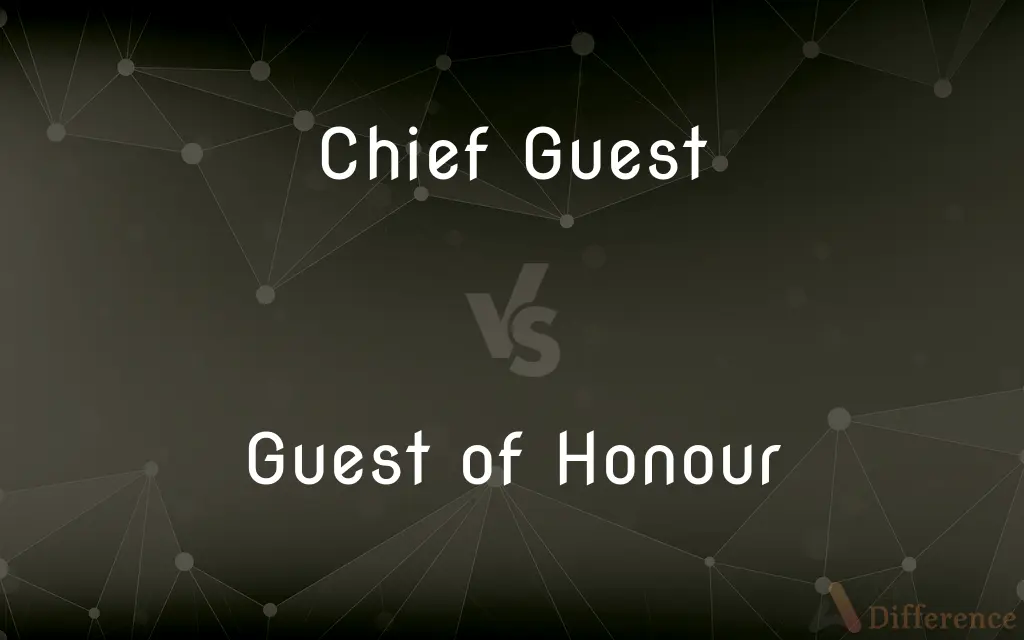Chief Guest vs. Guest of Honour — What's the Difference?
By Tayyaba Rehman — Published on November 12, 2023
Chief Guest refers to a primary invitee at an event, often involved in inaugurating functions. Guest of Honour holds special respect but may not have formal duties, typically being recognized or celebrated at events.

Difference Between Chief Guest and Guest of Honour
Table of Contents
ADVERTISEMENT
Key Differences
Chief Guest typically plays a pivotal role in an event’s proceedings, often being asked to inaugurate or commence the activities. Conversely, a Guest of Honour is a person invited to a gathering and accorded special respect, though they may not have specific formal duties during the event.
A Chief Guest is often involved in various ceremonial roles, such as cutting ribbons, delivering opening speeches, or handing out awards. On the other hand, a Guest of Honour might simply be expected to attend and enjoy the event, receiving recognition and possibly delivering a short speech or acknowledgement.
Often, a Chief Guest is someone with a degree of celebrity or a particular status that aligns with the event’s purpose, lending prestige and drawing attention. The Guest of Honour, meanwhile, might be recognized for their contributions, achievements, or status, fostering goodwill and perhaps enhancing the event’s profile through their presence.
In certain circumstances, the Chief Guest may also be the Guest of Honour, embodying both roles and being both the main inaugurating entity and a specially recognized individual. This duality brings together the formal, participatory aspect of the Chief Guest and the recognized, celebrated status of the Guest of Honour in one person.
Selection of a Chief Guest often relates to their potential to garner additional attention or publicity for an event. Conversely, the Guest of Honour might be chosen more for their relevance, contribution, or connection to the event, attendees, or organizers, creating a particular resonance or relevance throughout the gathering.
ADVERTISEMENT
Comparison Chart
Role
Often actively participates in event proceedings.
Primarily recognized and respected at the event.
Selection Criteria
May be chosen for celebrity, status, or relevance to event theme.
Selected for their relevance or contributions to the field/community.
Duties
Engages in ceremonial and formal activities (speeches, inaugurations).
May simply attend, be recognized, and possibly speak.
Expectations
Likely expected to draw attention and lend prestige to the event.
Expected to elevate the event’s status and offer prestige.
Engagement
Engages actively and is usually vital to the event’s conduct.
Attends and possibly participates, but isn’t vital for proceedings.
Compare with Definitions
Chief Guest
An individual invited to enhance an event's prestige and possibly attract attention or media coverage.
The celebrity chosen as the Chief Guest drew the media’s attention to the charity function.
Guest of Honour
Someone whose presence at an event is esteemed and celebrated, though not vital for proceedings.
The Guest of Honour, a renowned artist, was recognized for his contributions to the local art scene.
Chief Guest
Someone whose presence at an event is pivotal to its proceedings and symbolism.
The Chief Guest’s speech on environmental conservation was the highlight of the seminar.
Guest of Honour
A person recognized for their contributions and achievements during the event.
The Guest of Honour was celebrated for her breakthroughs in medical research.
Chief Guest
A primary invitee responsible for initiating the event’s activities.
The Chief Guest cut the ribbon, officially opening the new library to the public.
Guest of Honour
A person invited to an event who receives special recognition and attention.
The Guest of Honour was celebrated for their extensive philanthropic work.
Chief Guest
A person tasked with formal roles like giving speeches or presenting awards at events.
The Chief Guest delivered a compelling speech about the importance of community service.
Guest of Honour
An individual whose presence is meant to enhance the status and respect associated with an event.
The scientist, being the Guest of Honour, elevated the academic award ceremony’s stature.
Chief Guest
A prominent figure invited to an event to perform official functions.
The Chief Guest inaugurated the event by lighting the ceremonial lamp.
Guest of Honour
A notable figure invited to an event primarily for recognition, without specific duties or responsibilities.
The Guest of Honour was greeted with a standing ovation during the fundraiser.
Common Curiosities
How is a Chief Guest typically selected for an event?
Chief Guests are often chosen for their ability to attract attention, prestige, or relevance to the event theme.
Is it necessary for an event to have a Guest of Honour?
No, having a Guest of Honour is a choice, often made to add esteem and recognition to an event.
Is a Guest of Honour expected to perform official duties at an event?
Not usually; a Guest of Honour is primarily recognized and celebrated, although they may give a speech.
Can an individual be both Chief Guest and Guest of Honour?
Yes, an individual can serve as both, engaging in official functions and being specially recognized.
What are the key duties of a Chief Guest?
A Chief Guest typically inaugurates the event, delivers a speech, and engages in formal activities like award distribution.
How does a Guest of Honour enhance an event's stature?
A Guest of Honour, often being a respected individual, adds prestige to an event and may draw interest from attendees and possibly the media, especially if their achievements or status are relevant to the occasion.
Can there be multiple Guests of Honour at a single event?
Yes, events can feature multiple Guests of Honour, each recognized for their own achievements or contributions, and providing additional stature to the occasion.
Is a Guest of Honour obliged to engage with attendees or media during the event?
While engagement may be appreciated, a Guest of Honour is not typically obliged to interact with attendees or media unless they choose to do so or have agreed to such interactions beforehand.
What is the importance of having a Chief Guest at an event?
A Chief Guest can lend credibility, draw attention, and add a formal ceremonial aspect to an event, potentially elevating its profile and appeal.
Does a Chief Guest usually stay for the entire duration of an event?
It’s not a strict requirement, but Chief Guests often stay for significant portions of an event to engage in scheduled activities, though their attendance for the full duration can depend on prior agreements or protocols.
Is it necessary for a Chief Guest to have expertise in the event’s focus area?
While not mandatory, having a Chief Guest with expertise or a notable status in the event’s focus area can make their presence more relevant and impactful.
How should a Chief Guest be addressed or introduced during an event?
A Chief Guest is typically introduced with respect, highlighting their achievements, status, or relevance, and is often addressed with formal titles or honorifics appropriate to their context or culture.
Can the roles of Chief Guest and Guest of Honour be informal and flexible?
While traditionally adhering to certain norms, the roles can be adapted to suit the nature, culture, and informalities of a particular event or community.
How should one show appreciation or thanks to a Guest of Honour?
Expressing gratitude, providing tokens of appreciation, or offering formal thanks in speeches or written formats are common ways to appreciate a Guest of Honour.
Can the recognition of a Guest of Honour be posthumous or in-absentia?
Yes, individuals can be recognized as a Guest of Honour posthumously or in-absentia, acknowledging their contributions or relevance even in their absence.
Share Your Discovery

Previous Comparison
Whopper vs. Impossible Whopper
Next Comparison
File System vs. DBMSAuthor Spotlight
Written by
Tayyaba RehmanTayyaba Rehman is a distinguished writer, currently serving as a primary contributor to askdifference.com. As a researcher in semantics and etymology, Tayyaba's passion for the complexity of languages and their distinctions has found a perfect home on the platform. Tayyaba delves into the intricacies of language, distinguishing between commonly confused words and phrases, thereby providing clarity for readers worldwide.












































